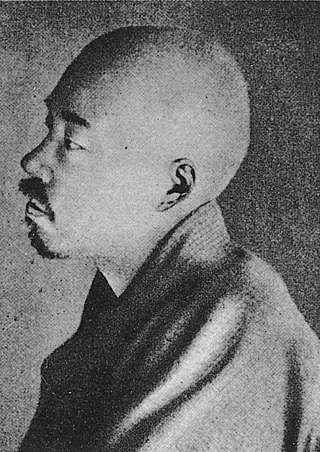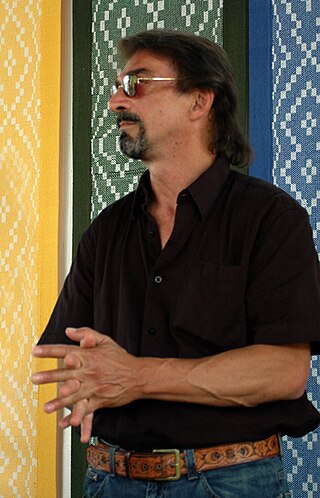Related Research Articles

Haiku is a type of short form poetry that originated in Japan. Traditional Japanese haiku consist of three phrases composed of 17 morae in a 5, 7, 5 pattern; that include a kireji, or "cutting word"; and a kigo, or seasonal reference. However, haiku by classical Japanese poets, such as Matsuo Bashō, also deviate from the 17-on pattern and sometimes do not contain a kireji. Similar poems that do not adhere to these rules are generally classified as senryū.
George Swede, is a Latvian Canadian psychologist, poet and children's writer who lives in Toronto, Ontario. He is a major figure in English-language haiku, known for his wry, poignant observations

Masaoka Shiki, pen-name of Masaoka Noboru, was a Japanese poet, author, and literary critic in Meiji period Japan. Shiki is regarded as a major figure in the development of modern haiku poetry, credited with writing nearly 20,000 stanzas during his short life. He also wrote on reform of tanka poetry.
Haibun is a prosimetric literary form originating in Japan, combining prose and haiku. The range of haibun is broad and frequently includes autobiography, diary, essay, prose poem, short story and travel journal.
Hokku is the opening stanza of a Japanese orthodox collaborative linked poem, renga, or of its later derivative, renku. From the time of Matsuo Bashō (1644–1694), the hokku began to appear as an independent poem, and was also incorporated in haibun. In the late 19th century, Masaoka Shiki (1867–1902) renamed the standalone hokku as "haiku", and the latter term is now generally applied retrospectively to all hokku appearing independently of renku or renga, irrespective of when they were written. The term hokku continues to be used in its original sense, as the opening verse of a linked poem.
Mykel Board is an American journalist, musician, and writer of English-language haiku.
Nicholas Anthony Virgilio was an internationally recognized haiku poet who is credited with helping to popularize the Japanese style of poetry in the United States.

Matsuyama is the capital city of Ehime Prefecture, on the island of Shikoku, in Japan and is also Shikoku's largest city. As of 1 October 2022, the city had an estimated population of 505,948 in 243,541 households and a population density of 1,200 persons per km2. The total area of the city is 429.35 square kilometres (165.77 sq mi).
The Haiku Society of America is a non-profit organization composed of haiku poets, editors, critics, publishers and enthusiasts that promotes the composition and appreciation of haiku in English. Founded in 1968, it is the largest society dedicated to haiku and related forms of poetry outside Japan, and holds meetings, lectures, workshops, readings, and contests, throughout the United States. The society's journal, Frogpond, first published in 1978, appears three times a year. As of 2022, the HSA has over 1,000 members.
A haiku in English is an English-language poem written in a form or style inspired by Japanese haiku. Like their Japanese counterpart, haiku in English are typically short poems and often reference the seasons, but the degree to which haiku in English implement specific elements of Japanese haiku, such as the arranging of 17 phonetic units in a 5–7–5 pattern, varies greatly.

James Michael Kacian is an American haiku poet, editor, translator, publisher, organizer, filmmaker, public speaker, and theorist. He has authored more than 20 volumes of English-language haiku, and edited scores more, including serving as editor-in-chief for Haiku in English: The First Hundred Years. In addition, he is founder and owner of Red Moon Press (1993), a co-founder of the World Haiku Association (2000), and founder and president of The Haiku Foundation (2009).
Wally Swist is an American poet and writer. He is best known for his poems about nature and spirituality.

Alan Pizzarelli is an American poet, songwriter, and musician. He was born of an Italian-American family in Newark, New Jersey, and raised in the first ward’s Little Italy. He is a major figure in English-language haiku and Senryū.
Lee Gurga is an American haiku poet. In 1997 he served as president of the Haiku Society of America. He was the editor of Modern Haiku magazine from 2002 to 2006, and is the current editor of the Modern Haiku Press. Gurga lives in Lincoln, Illinois, where he works as a dentist. Also involved in the translation of Japanese haiku into English, Gurga cites Matsuo Bashō, a Japanese poet from the Edo period, as one of his main appreciations. One of his most known haiku is about graduation day for students and is presented in his book Haiku: A Poet's Guide.
The Masaoka Shiki International Haiku Awards, named after the founder of modern Japanese haiku, were established on the principles set forth in the Matsuyama Declaration, adopted at the Shimanamikaido '99 Haiku Convention in Matsuyama held in September 1999. The establishment of this award attracts people's attention to Masaoka Shiki as a globally recognized poet and to haiku as a short form of world poetry.

Frogpond is a haiku magazine published by the Haiku Society of America. It is published electronically three times per year and consists of English-language haiku and senryu, linked forms including sequences, renku, rengay, and haibun, essays and articles on these forms, and book reviews. Submissions may come from members and nonmembers. The first issue was published in February 1978.
The British Haiku Society (BHS) was formed in 1990 and aims to promote haiku and to teach and publish Haiku in English.

Carlos Colón was an American poet. He primarily wrote English-language haiku and concrete poems. During his lifetime, he published over 12 chapbooks and over 1,400 poems published in a variety of journals including Modern Haiku and Frogpond.
Dee Evetts is an English haiku poet and writer.
The Association of Haiku Poets is a Japanese professional association of haiku poets and enthusiasts. It was founded in 1961 by a group of haiku poets that separated from the Modern Haiku Association. The association manages the Museum of Haiku Literature in Tokyo.
References
- ↑ his son
- ↑ Cor van den HEUVEL Archived 2013-01-26 at archive.today on the Haiku International Association website
- ↑ Prune Juice, Journal of Senryu and Kyoka Issue 1, Winter 2009, p.145 Archived July 6, 2009, at the Wayback Machine
- ↑ Foley, Jack. Review of The Haiku Anthology in The Alsop Review Archived October 19, 2006, at the Wayback Machine
- ↑ Heuvel, Cor van den (15 July 2023). Splashes. House of Haiku. ISBN 978-0962604058.